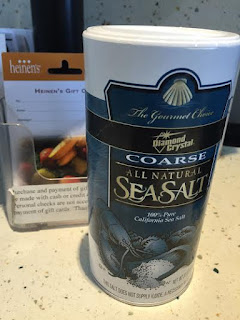Trainer
Tuesdays
Welcome back to the weekly edition on Trainer Tuesdays. Make sure to check in at our blog every Tuesday evening to learn the expertise of our great staff. Aside from being fantastic exercise coaches, they are also extremely knowledgeable in many aspects of health and fitness; so, it's time that you get to know them a little better! Each week, we will post a frequently asked, or sometimes just a fun fitness related question followed by the answers of each of the trainers at Fitness Together Brecksville.
What is worse for your diet, sugar
or sodium?
In the past, we debated sugar vs.
fat and determined that sugar was the unanimous culprit. It’s time to put sugar
up against its next opponent and take a look at sugar vs. salt.
 |
**Please note that when we say sugar it refers to added and processed
sugars that are not found naturally in food. The body does need glycogen at the
molecular level to sustain life itself; but that glycogen will be produced
naturally by the body by breaking down carbohydrates found in natural fruits,
vegetables and whole grains.
 |
| Justin Traft says Sea Salt is better than refined. |
Justin Traft:
Many clients ask what the worst thing could be in their diet that they
need to change or adjust. Two that come to mind right away are sugar and
sodium. One is just as bad as the other in large amounts. Sodium is one
that can do a lot of damage in a hurry. See, as vital as it is, the human
body needs only very little salt. The daily upper limit for adults is around
2,300 milligrams. For those aged 51 years and above, it should be just 1,500
mg. For children it’s even less with the limit set at 1,000 mg a day. There are
two types of edible salt. Regular table salt which is the
refined variety with more additives such as iodine. The other being unrefined
or less refined types like kosher salt and also sea salts which are made by evaporating seawater. The
cons of salt is that if you have hypertension, renal disease or
hypernatremia (condition where there’s more sodium than water in your
body) high amounts of salt can be deadly to these conditions or using
salt in an uncontrolled manner can cause you to develop some of these diseases.
It can also cause damage to critical organs such as blood vessels, heart,
kidney and even the brain. Pros are that your body to a degree does need
sodium chloride to recover after those tough workouts. It’s in most bottled
sports drinks… it moves in and out of cells and it is this activity that
helps generate and transmit nerve impulses. It’s also part of the
delicate balance of fluids and substances in and outside of cells. Sodium
chloride along with the other electrolytes such as potassium, calcium and
magnesium need to be constantly kept in just the right amounts in order for the
physiological activities they affect to continue normally.
Jessica Regula: In my personal opinion, sugar is WAY worse for you!
Some salt is needed in your diet in order to maintain blood pressure, mineral
levels, and fluids. Sugar is highly addictive and has even been compared to
drugs. When I gave up all sugar I went through a terrible detox that included night
sweats, the shakes, extreme irritability, and many other unpleasant symptoms.
This made me wonder what in the world is in sugar?! The process of sugar detox
is often associated with the process of drug addicts...there are relapses,
withdrawals, and many struggles. It is honestly something I never want to go
through again. I would recommend sticking with naturally found sugars, such as
those found in fruits, maple syrup, honey, or coconut sugar. The worst part
with our food nowadays, is that they put sugar in everything (even things that
you wouldn't expect like crackers, nut butters, etc). This causes you to get
used to things that are too sweet, so you begin to crave sweets more often,
most of the time being unsatisfied and left craving more. This causes you go
overeat and gain unnecessary pounds. In my opinion, stay away from sugar. It's
tough in the beginning, but once you stick with it, you will feel much better
and your body will thank you!
Kelly Bailey: In my opinion, salt is probably
the lesser of two evils. Our bodies actually need sodium to help us regulate
blood pressure and help with nerve and muscle function. Sugar, on the
other hand, can be totally eliminated from your diet without ill effects. Those
people that cut out sugars by eliminating processed foods and table
sugar in their diet are healthier!
The reality is that most people
aren't getting overdoses of sugar and salt from a shaker, and neither
salt nor sugar is inherently evil or dangerous to human health. People get
into trouble because of the amounts of sugar and salt packed into the
processed convenience foods that they eat every day. While it may be less
convenient, I am a huge proponent of going back to cooking meals at home, from
scratch. In addition, I advocate eliminating processed foods in favor of
whole, real foods (i.e. vegetables, fruits, nuts, seeds, eggs,
fish, chicken, beef). The more often you eschew processed foods and prepare
whole, real food at home, the less you need to worry about
consuming excess salt and sugar.
Adam Teplitz: Sugar and salt are two
essential nutrients. However, both have their pros and cons. As vital as
it is, the human body needs only very little salt. The daily upper limit for
adult is 2300 mg. The two major elements that make up regular table salt
perform essential functions in the body. Sodium is one of those nutrient
minerals called electrolytes. These compounds carry an electrical charge and
therefore conduct electricity. In addition to this, sodium moves in and out of
cells to help generate and transmit nerve impulses. This is part of the balance
of fluids in and outside the cells. This is fundamental in the way the body keeps
itself hydrated. The many risks include kidney disease, high blood pressure and
strokes. Sugar is vital for the body as well, but it all comes to down what
type of sugar you're consuming. Simple carbs spike your blood sugar rapidly and
can lead to weight gain when consumed in excess. Complex carbs can give you
sustained energy without spiking your blood sugar. It all comes to the
appropriate balance. Moderation and staying within the daily requirements is
key.
Steven Madden: Well, for fear
of sounding unoriginal, once again, sugar is worse for you. That's not to say go crazy on the salt
though. Increased salt levels leads to
higher blood pressure (hypertension).
However, you don't necessarily have to throw out your salt shaker. When trying to limit sodium, simply sprinkling on a little salt does not
add up to most of your salt intake in a day.
The real way to limit sodium is to eat unprocessed foods. That's where almost all sodium consumption
comes from. So, if you just made some
homemade soup from scratch, add a little salt, but if you just got it from a
can, the salt content is already high.
 |
| Fitness Together personal trainers agree to get sugar naturally! |
As for sugar, we all know that too much sugar leads to increased
body fat and can cause further problems like diabetes. However, too much sugar is also bad in terms
of sodium. When you consume sugar (all
carbs actually) your body releases insulin into the blood stream to remove the
sugar. A side effect of insulin though
is that it causes your kidneys to hold on to sodium. So regular consumption of excess sugar will
lead to higher sodium levels. So since
sugar can exacerbate salt related problems, I have to say that sugar is worse
than salt. Still though, everything in
moderation.
Lisa Clark: Sodium
alone can cause hypertension. Sugar can cause obesity and all the various
health problems related to obesity as well as diabetes. However even on a low
sodium diet sugar causes the body to store excess salt. Therefore exacerbating
the negative effects of sodium. Making sugar clearly the worst culprit.
©
2015 Fitness Together, Inc. All Rights Reserved. Powered by Fusionbox.
About | Contact | Franchise | Suppliers | History | Leadership | NutritionTogether |Sitemap | PrivacyPolicy | TermsofUse | Facebook | YouTube | Twitter | Linkedin

No comments:
Post a Comment